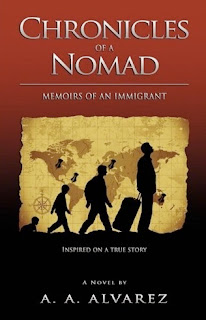Entry #2 of the 2011 Copa America Film & Book Festival.
Book: Chronicles of a Nomad by A.A. Alvarez
Film: El Don (2006, José Ramón Novoa)
Bonus Film: Araya (1959, Margot Benacerraf)
Chronicles of a Nomad sheds a light on certain aspects of Venezuelan life in the late 1980's and early 90's such as corruption, political power games, the rise of Hugo Chavez and the banking crisis. Also, the book lays out the cultural jolt that an immigrant experiences upon arriving in a new nation by describing travels across three countries -- Venezuela, US and Greece. However, this self-published work could have certainly benefited from an independent editor who would have made some obvious corrections, helped trim some excess and provided a tighter framework. Example: another pair of eyes would certainly have caught the missing 'not' in the following line of a chapter's opening paragraph:
After Al Gore was elected president of the United States and George W. Bush entered the oval office, it started to rain on our little parade and apparently the country’s sweet economy was made of sugar; and it started to dissolve very rapidly.
El Don is the story about a person’s rise to power and eventual downfall due to political and criminal elements. A proper description of the film is marred by the fact that the DVD copy of the film was without any English subtitles. Still, I was able to grasp bits of the overall structure due to the presence of familiar cinematic characters in the form of omnipresent television reporters, gangsters, and corrupt policemen and politicians. The presence of subtitles would not have elevated the film to a higher rating as the low budget production contains substandard technical aspects (cinematography, sound, editing) and melodramatic acting.
The most memorable aspect of El Don is the presence of Édgar Ramírez who turned in one of the best performances of 2010 in Carlos. Ramírez does not have the main role in El Don but plays Alvaro, a young sidekick with an easy going appearance. Alvaro, who has long hair, wears blue jeans and is always chewing gum, is an ocean away from the smooth talking well dressed Carlos. It is only near the end of El Don that Ramirez's character shows a strong yet negative side in one scene thereby allowing one to draw a faint line from El Don to Carlos. Of course, Édgar Ramírez did not jump to Carlos directly from El Don but instead had multiple roles in films such as The Bourne Ultimatum, Vantage Point, Che: part One before landing up in Carlos.
Margot Benacerraf's Araya depicts the struggles and rhythms of workers who toiled for centuries working in salt mines in the Northern part of Venezuela. This 1959 black and white film contains many beautiful images but unfortunately they are ruined by non-stop narration, which ends up getting repetitive because the filmmaker chose to not let a few minutes go by in silence. The audience is always kept at a distance because at no point do we ever hear the workers talk in their own voices. The film could have certainly benefited from less narration and more use of local sounds and voices, thereby letting the audience get a closer look at the workers.
Comments
Normally one points to certain mistakes made by a filmmaker or an author when one comes across a disappointing work. However, in this case, I feel a bit guilty in the disappointing film and book picked. This is because I wanted to pick entries that represented each country very well in this Copa America spotlight. Also, since the Venezuelan soccer team usually finishes bottom of their group, I had hoped to find a book and film that ensured Venezuela had a decent showing. As things stand, both the Venezuelan book and film are on course to finish bottom in the 2011 Copa America Film & Book festival. One cannot imagine the Venezuelan soccer team to do much better in Argentina at the Copa America as they are in Group B alongside Brazil, Paraguay and Ecuador.

No comments:
Post a Comment